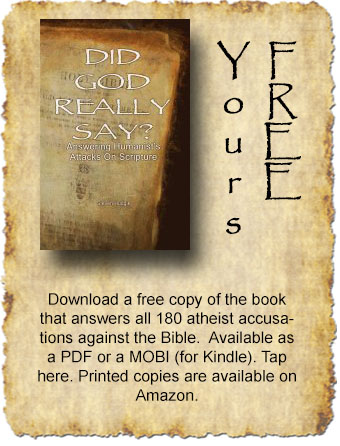Atheist's Attacks
Answering Humanist's Accusations Against the Bible


Cruelty In The Bible?
The day of the LORD cometh...
Does God command children be dashed to pieces?

THE HUMANIST CLAIMED CRUELTY: Isaiah 13:9,15-18 contains this message from God: “Behold, the day of the Lord cometh, cruel both with wrath and fierce anger. . . . Every one that is found shall be thrust through. . . . Their children also shall be dashed to pieces before their eyes . . . and their wives ravished. Behold, I will stir up the Medes against them. . . . [T]hey shall have no pity on the fruit of the womb; their eyes will not spare children.”
Humanists, in general, do not understand scripture. That makes sense. They are the blind leading the blind (Matthew 15:14). Their key error here is that they have taken prophecies about two separate events, separated by thousands of years, and combined them. The prophecy in Isaiah 13:9 is talking about something different from the prophecy in Isaiah 13:15-18. A key phrase that tells us this is "the day of the LORD."
The Day Of The Lord
"The day of the LORD" is a phrase from Amos that refers to the second coming of the Messiah. This is the day when Jesus Christ returns in judgment. The first time the Son of God came, just over 2000 years ago, He came to bring salvation through His death on the cross. When He returns He will bring judgment.
Let’s read Isaiah 13 verses 9-11 to get the context:
9 -Behold, the day of the Lord is coming,
Cruel, with fury and burning anger,
To make the land a desolation;
And He will exterminate its sinners from it.10 - For the stars of heaven and their constellations
Will not flash forth their light;
The sun will be dark when it rises
And the moon will not shed its light.11 - Thus I will punish the world for its evil
And the wicked for their iniquity;
I will also put an end to the arrogance of the proud
And abase the haughtiness of the ruthless.
Prophecy often has dual fulfillment. It will describe things that will happen in the near future, and at the same time events that will happen in the far future. The near and far events are related, often with the near future events giving a picture (foreshadowing) of the far in the future events. The near future events are thus a tangible warning that the far future events will happen, and people need to change their ways–turn to the Lord and away from sin.
Please Open Your Bible to Isaiah 13
“The day of the LORD” does not refer to the Lord coming in the nearterm. It refers to a future time when the Lord will return to judge (punish) the entire world. Those days are called end times, as described in Revelation. The verses in Isaiah 13 are about Babylon's destruction during the end times. This is a far-future prophecy about the time when Jesus Christ returns.
Isaiah chapter 13 begins by talking about the Babylonian Em-pire, which at the time of the prophecy is still in the future. Verses 1 through 5 are a near future prophecy about Babylon, with verse 5 referring to the destruction of Babylon by the Medes.
In verse 6, with the phrase "for the day of the Lord is near" the prophecy switches to the far future and the Babylon of the end times. This continues through verse 14. Then in verse 15 the prophet Isaiah returns to talking about the near term Babylon, describing the coming time when the Medes will commit atrocities in the captured land of Babylon. Verses 15-19 are on the next page. Notice that these are descriptive, not prescriptive. In other words, they are de-scribing what the Medo-Persianss will do, not what God says they should do. This is a description of the brutality of war as practiced by the Medo-Persians.
15 - Anyone who is found will be thrust through,
And anyone who is captured will fall by the sword.16 - Their little ones also will be dashed to pieces
Before their eyes;
Their houses will be plundered
And their wives ravished.
Babylon Will Fall to the Medes17 - Behold, I am going to stir up the Medes against them,
Who will not value silver or take pleasure in gold.18 - And their bows will mow down the young men,
They will not even have compassion on the fruit of the womb,
Nor will their eye pity children.19 - And Babylon, the beauty of kingdoms, the glory of the Chaldeans’ pride,
Will be as when God overthrew Sodom and Gomorrah.
Verse 9, referenced by the humanists, is an end times prophecy, and verses 15-18 are a near term prophecy about the Medes con-quest of Babylon. Verse 16, describing babies being killed, is not a command from God. It is describing the brutality of the invading Medo-Persians.
Conclusion: The humanists are mixing two widely separate times to make it seem God is to blame for the cruelty of the Medo-Persians. In reality, the humanistic cruelty of the Medo-Persians is being described.
Next accusation: The God of the Bible displayed his sadistic tendencies by employing a variety of other means to torment and kill people.
He caused the earth to open and swallow entire families (Numbers 16:37-32); he used fire to devour people (e.g., Leviticus 10:1-2; Numbers 11:1-2); and he punished the Israelites with wars, famines, and pestilences (e.g., Ezekiel 5:11-17).
He sent wild animals such as bears (II Kings 2:23-24), lions (II Kings 17:24-25), and serpents (Numbers 21:6) to attack people; he sanctioned slavery (e.g., Leviticus 25:44-46); he ordered religious persecution (e.g., Deuteronomy 13:12-16); and he caused cannibalism (Jeremiah 19:9).
Now they are really trying to pile it on, without any explanations of what exactly they are claiming. Let's see if we can sort it all out. Click here...
30 SECOND VIDEOS

GOD & BIBLE:
Why Doesn't God End Evil?
Do Miracles Mean The Bible Is A Fairy Tale?
Was Jesus' Resurrection Real or Fake?
Do Babies Go To Heaven?
Can We Know God Exists?
_________________
AGE OF EARTH:
Carbon Dating Says The Earth is Young
The Failure of Radio Isotope Dating
The Age of the Earth - Helium In Rocks
Dinosaur Soft Tissue Shows Dating Methods Don't Work
Does DNA Show Eve Was Created 6,000 Years Ago?
